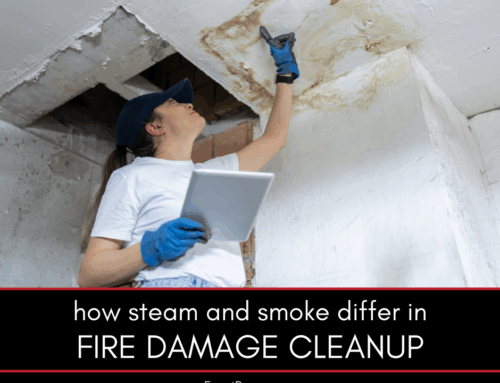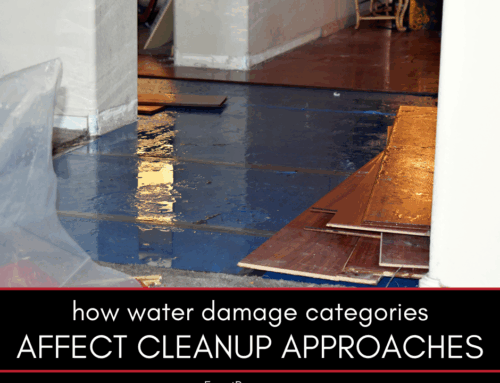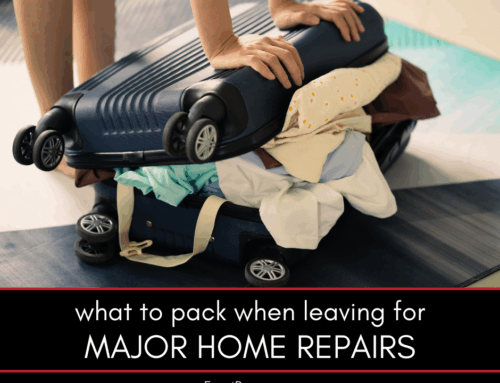A burst pipe can cause significant damage to your home, and knowing how to respond quickly can save you time and money. Whether the pipe bursts due to freezing temperatures, corrosion, or high water pressure, taking immediate action is essential. This guide explains what to do if a pipe bursts in your home and how to handle the aftermath effectively.
What to Do if a Pipe Bursts in Your Home
A burst pipe can create chaos, but following the right steps can minimize the damage and get you back on track. This guide explains the following:
- Turning off the water and electricity
- Containing the water and minimizing damage
- Documenting the damage for insurance
- Calling Exact Recon for professional assistance
- Preventing future pipe bursts
Here’s a closer look at each.
Turning Off the Water and Electricity
The first thing you need to do when you discover a burst pipe is turn off the main water supply to your home. Locate your main shut-off valve—typically found in a basement, crawl space, or near the water heater—and close it immediately. This step stops additional water from flooding your home and limits the extent of the damage.
If water is pooling near electrical outlets, appliances, or wiring, it’s crucial to turn off the electricity to avoid potential hazards. Use your home’s circuit breaker to shut off power in the affected areas. Safety should always come first, so don’t hesitate to contact an electrician if you’re unsure about handling electrical systems.
Containing the Water and Minimizing Damage
Once the water is turned off, take steps to contain the damage. Use towels, mops, and buckets to soak up standing water. If the burst pipe is causing active leaks, place a bucket or container under the leak to catch the dripping water. For severe flooding, consider renting a wet/dry vacuum or contacting a water extraction professional.
Move furniture, electronics, and valuable items out of the affected area to prevent further damage. If the leak occurs during freezing weather, inspect other pipes for signs of freezing or cracking and take preventive measures to protect them.
Documenting the Damage for Insurance
Accurate documentation is critical for your insurance claim. Take clear, high-resolution photos and videos of the damaged area, including the burst pipe, water damage, and any affected belongings. Create a detailed inventory of all damaged items, noting their approximate value, condition before the incident, and purchase receipts if available.
Notify your insurance company as soon as possible to begin the claims process. Provide them with your documentation and be ready to answer questions about the incident. Prompt communication with your insurance adjuster can help speed up your claim and ensure you receive the compensation you need.
Calling Exact Recon for Professional Assistance
Working with a professional restoration team like Exact Recon can make a world of difference when dealing with a burst pipe. We specialize in water damage restoration and can handle every step of the cleanup and repair process. From assessing the damage to drying out your home and restoring affected areas, our team ensures that your property is safe and livable again.
We’ll also work directly with your insurance company to streamline your claim. Our expertise in handling burst pipe incidents means you can trust us to restore your home efficiently and effectively.
Preventing Future Pipe Bursts
Preventing pipe bursts starts with regular maintenance. Insulate pipes in unheated areas like basements, attics, and crawl spaces to protect them from freezing temperatures. During winter, let faucets drip slightly to keep water flowing and reduce the risk of freezing.
Check your home’s water pressure regularly using a pressure gauge. High water pressure can strain pipes and increase the likelihood of bursting. If necessary, install a pressure-reducing valve to keep the pressure at a safe level.
Inspect your plumbing system for signs of corrosion, leaks, or damage, and address issues promptly. Replacing old or damaged pipes can save you from costly repairs down the line.
FAQ About Burst Pipes
Check out these commonly asked questions about burst pipes. If you don’t see your question here, please call our office and we’ll find you the answers you need.
What Are the Most Common Causes of Burst Pipes?
Burst pipes are often caused by freezing temperatures, high water pressure, corrosion, or physical damage. Poor insulation and sudden temperature changes can also contribute to pipe failure.
How Can I Tell If a Pipe Is About to Burst?
Signs of a potential pipe burst include unusual noises like banging or whistling, fluctuating water pressure, and visible corrosion or leaks. Addressing these issues early can prevent a burst pipe.
Should I Attempt to Fix a Burst Pipe Myself?
While minor leaks can sometimes be temporarily patched, it’s best to contact a professional for permanent repairs. Improper fixes can lead to further damage and higher costs.
Does Insurance Cover Burst Pipes?
Most homeowner’s insurance policies cover damage caused by burst pipes, but coverage may depend on the cause of the burst. For example, damage from neglect or lack of maintenance may not be covered.
How Long Does It Take to Repair a Burst Pipe?
The timeline for repairs depends on the extent of the damage. Minor repairs can be completed in a few hours, while extensive damage may take several days to address.
Dealing with a burst pipe can be stressful, but knowing what steps to take can make the process easier. By acting quickly, documenting the damage, and working with professionals like Exact Recon, you can minimize the impact and restore your home with confidence.
Do You Need a Disaster Remediation Expert in Washtenaw County or Jackson County?
If your home has already been damaged, we can help. Check out our services and get a free disaster remediation quote today. We offer:
- Water damage restoration
- Fire damage restoration
- Mold removal and remediation
- Fire and smoke restoration
- Sewer cleanup and disinfecting
- Reconstruction
- Wind and storm damage repair









